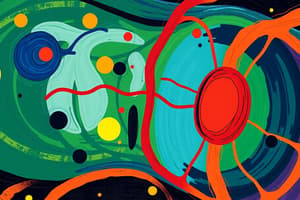Podcast
Questions and Answers
What is the primary role of first messengers in hormone signaling?
What is the primary role of first messengers in hormone signaling?
- Activate second messengers.
- Directly alter gene expression.
- Bind to DNA in target cells.
- Provide communication between gland and target organ. (correct)
How do steroid hormones primarily influence target cell activity?
How do steroid hormones primarily influence target cell activity?
- By acting directly on DNA within the nucleus. (correct)
- By increasing transcription rates only.
- By activating protein synthesis quickly.
- By binding to membrane receptors.
Which mechanism primarily controls hormone levels in the blood?
Which mechanism primarily controls hormone levels in the blood?
- Homeostatic regulation. (correct)
- Hormonal amplification.
- Positive feedback.
- Direct stimulation.
Which of the following hormones is an example of a nonsteroid hormone?
Which of the following hormones is an example of a nonsteroid hormone?
What is a secondary effect of steroid hormone action?
What is a secondary effect of steroid hormone action?
Which type of hormone action is generally faster?
Which type of hormone action is generally faster?
Which process is not typically associated with second messengers?
Which process is not typically associated with second messengers?
Which of the following hormones primarily operates via a second messenger mechanism?
Which of the following hormones primarily operates via a second messenger mechanism?
What is the primary function of prostaglandins in the body?
What is the primary function of prostaglandins in the body?
Which mechanism is characterized by amplifying physiological changes, such as muscle contractions during labor?
Which mechanism is characterized by amplifying physiological changes, such as muscle contractions during labor?
Where do hypothalamic hormones like ADH and oxytocin get produced?
Where do hypothalamic hormones like ADH and oxytocin get produced?
How do hypothalamic releasing hormones impact the anterior pituitary gland?
How do hypothalamic releasing hormones impact the anterior pituitary gland?
Which of the following functions is NOT controlled by the hypothalamus?
Which of the following functions is NOT controlled by the hypothalamus?
What role do paracrine agents play in the body?
What role do paracrine agents play in the body?
What hormone is secreted by the parathyroid glands?
What hormone is secreted by the parathyroid glands?
What is the primary function of parathyroid hormone (PTH)?
What is the primary function of parathyroid hormone (PTH)?
Which statement is true about the secretion of hormones from the posterior pituitary gland?
Which statement is true about the secretion of hormones from the posterior pituitary gland?
Which layer of the adrenal gland secretes mineralocorticoids?
Which layer of the adrenal gland secretes mineralocorticoids?
What effect do prostaglandins have on the body's functioning?
What effect do prostaglandins have on the body's functioning?
What triggers the adrenal medulla to release hormones?
What triggers the adrenal medulla to release hormones?
What is the primary function of antidiuretic hormone (ADH)?
What is the primary function of antidiuretic hormone (ADH)?
Which hormone is NOT secreted by the adrenal cortex?
Which hormone is NOT secreted by the adrenal cortex?
Which hormone is responsible for milk secretion after delivery?
Which hormone is responsible for milk secretion after delivery?
What is a potential consequence of excessive blood calcium levels?
What is a potential consequence of excessive blood calcium levels?
What effect do thyroid hormones (T3 and T4) have on the body's metabolic rate?
What effect do thyroid hormones (T3 and T4) have on the body's metabolic rate?
Which hormone's secretion from the adrenal cortex is primarily stimulated by ACTH?
Which hormone's secretion from the adrenal cortex is primarily stimulated by ACTH?
What effect does parathyroid hormone have on the kidneys and intestines?
What effect does parathyroid hormone have on the kidneys and intestines?
How does calcitonin (CT) affect blood calcium levels?
How does calcitonin (CT) affect blood calcium levels?
Which hormone is primarily involved in initiating labor?
Which hormone is primarily involved in initiating labor?
What is the role of iodine in the production of thyroid hormones?
What is the role of iodine in the production of thyroid hormones?
What is a function of oxytocin besides milk ejection?
What is a function of oxytocin besides milk ejection?
What happens to urine secretion as a result of ADH activity?
What happens to urine secretion as a result of ADH activity?
What hormone is secreted by the alpha cells of the pancreatic islets?
What hormone is secreted by the alpha cells of the pancreatic islets?
What primary function does insulin perform regarding blood glucose?
What primary function does insulin perform regarding blood glucose?
Which of the following is a secretion of the ovarian follicles?
Which of the following is a secretion of the ovarian follicles?
Which hormone is primarily secreted by the corpus luteum?
Which hormone is primarily secreted by the corpus luteum?
What hormone is associated with the maturation of external male genitals?
What hormone is associated with the maturation of external male genitals?
What is the primary function of thymosin in the body?
What is the primary function of thymosin in the body?
Which effect is attributed to estrogen secretion from ovarian follicles?
Which effect is attributed to estrogen secretion from ovarian follicles?
Which of the following is NOT a function of testosterone?
Which of the following is NOT a function of testosterone?
Flashcards are hidden until you start studying
Study Notes
Second Messenger Mechanism
- Protein/peptide hormones are the first messengers that transmit information between glands and target organs or cells.
- These hormones bind to receptors on the target cell membrane, activating second messengers.
- Second messengers affect cellular activities by increasing or decreasing the expression of specific genes, including transcription, translation, and protein synthesis.
- Examples of nonsteroid hormones include TSH, glucagon, insulin, epinephrine, and prolactin.
Steroid Hormone Action
- Steroid hormones are lipid-soluble (cholesterol-derived).
- They bind to receptors within the target cell nucleus, influencing cellular activity by acting directly on DNA.
- This process is slower than nonsteroid hormone action.
- Steroid hormones can also bind to membrane receptors, triggering rapid functional changes in the target cell.
Regulation of Hormone Secretion
- The body uses negative feedback mechanisms to control hormone levels in the blood.
- These mechanisms reverse the direction of changes in physiological systems, like blood sugar levels.
- Positive feedback mechanisms amplify or encourage physiological changes, but these are uncommon.
- Examples include muscle contractions during labor and breast milk production (oxytocin).
Prostaglandins (PGs)
- PGs are tissue hormones made of lipids that play a significant role in communication and body function regulation.
- They are often produced and secreted in a tissue and act on cells within that same tissue.
- PGs are referred to as "paracrine agents" because they are released near their target cells rather than traveling long distances.
- They affect respiration, blood pressure, GI secretions, inflammation, and the reproductive system.
- PGs can influence the production of cyclic adenosine monophosphate (cAMP).
Hypothalamus and Pituitary Hormones
- The hypothalamus is a brain area that connects the nervous system to the endocrine system via the pituitary gland.
- The hypothalamus produces ADH and oxytocin, which are transported to the posterior pituitary gland.
- The release of posterior pituitary hormones is controlled by nervous stimulation.
- The anterior pituitary gland releases hormones with the help of hypothalamic releasing hormones (RHs) and inhibiting hormones (IHs).
- These hormones are delivered via blood vessels and bind to receptors on specific anterior pituitary cells, triggering hormone release.
- The hypothalamus controls many body functions related to homeostasis, including temperature, appetite, thirst, and the secretion of milk after childbirth.
Pituitary Gland
- The posterior pituitary gland (neurohypophysis) secretes two hormones:
- Antidiuretic hormone (ADH): Regulates fluid balance by accelerating water reabsorption from urine in kidney tubules into the blood, thereby decreasing urine secretion and preventing dehydration.
- Oxytocin (OT): Stimulates uterine contractions during pregnancy, potentially initiating labor. It also causes breast glands to release milk into ducts and enhances social bonding between mother and infant.
Thyroid Gland
- The thyroid gland produces two hormones:
- Thyroid hormones: Thyroxine (T4) and triiodothyronine (T3), produced using iodine from food.
- Calcitonin (CT): Decreases blood calcium concentration by inhibiting bone breakdown, preventing hypercalcemia.
- Thyroid hormones affect all body cells by accelerating catabolism, increasing the body's metabolic rate, and speeding up energy release from nutrients.
Parathyroid Glands
- The parathyroid glands secrete parathyroid hormone (PTH).
- PTH increases blood calcium concentration by accelerating bone breakdown and releasing the stored calcium into the blood.
- PTH also operates on the kidneys and intestines to increase blood calcium levels.
- High blood calcium levels can cause brain and heart cell malfunction.
- Low blood calcium results in overactive nerve cells and muscle spasms.
Adrenal Glands
- The adrenal glands are composed of two distinct endocrine glands:
- Adrenal cortex (outer layer): Composed of glandular epithelium stimulated by ACTH from the anterior pituitary.
- Adrenal medulla (inner layer): Composed of secretory nervous tissue stimulated by the sympathetic nervous system.
- Both layers work together in response to stress.
- The adrenal cortex contains three cell layers (zones) and secretes corticoid hormones:
- Outer layer: Secretes mineralocorticoids (MCs), like aldosterone.
- Middle layer: Secretes glucocorticoids (GCs), like cortisol (hydrocortisone).
- Inner layer: Secretes sex hormones, like small amounts of male hormones (androgens) for both sexes, which contribute to the development of reproductive organs and sex drive in women.
Pancreatic Islets
- The pancreatic islets (islets of Langerhans) secrete two hormones:
- Glucagon: Secreted by alpha cells; increases blood glucose levels by accelerating liver glycogenolysis (conversion of glycogen to glucose).
- Insulin: Secreted by beta cells; decreases blood glucose levels by accelerating glucose movement from the blood into cells, which increases glucose metabolism by cells.
Female Sex Glands
- The ovaries contain two structures that secrete hormones:
- Ovarian follicles: Secrete estrogen.
- Corpus luteum: Secretes mainly progesterone (involved in conception and pregnancy) and some estrogen.
- Estrogen's effects include:
- Development and maturation of breasts and external genitalia.
- Development of an adult female body physique.
- Initiation of the menstrual cycle.
Male Sex Glands
- The interstitial cells of the testes secrete testosterone directly into the blood.
- Testosterone's effects:
- Maturation of external genitals.
- Beard growth.
- Voice changes at puberty.
- Development of musculature and body contours typical of males.
Thymus
- The thymus gland is located in the mediastinum and plays a crucial role in the development of many immune cells.
- It secretes thymosin (a group of hormones) that regulate the development and function of T-cells, which are immune agents that defend against infection and cancer.
Studying That Suits You
Use AI to generate personalized quizzes and flashcards to suit your learning preferences.




